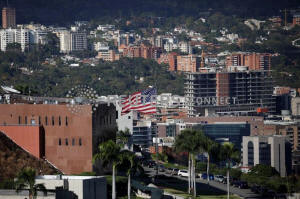|
With Venezuela convulsed by crisis,
Trump's hawks take dramatic turn
 Send a link to a friend
Send a link to a friend
 [January 25, 2019]
By Roberta Rampton, Matt Spetalnick and Patricia Zengerle [January 25, 2019]
By Roberta Rampton, Matt Spetalnick and Patricia Zengerle
WASHINGTON (Reuters) - When U.S. national
security adviser John Bolton branded Venezuela as part of a hemispheric
"troika of tyranny" in a speech in November, the Trump administration
was still struggling to decide how far it would go in confronting the
country's socialist president, Nicolas Maduro.
But what has taken shape in recent days is a sharply more aggressive
approach based on President Donald Trump's full-throated backing for
opposition leader Juan Guaido and bolstered by a coordinated diplomatic
response with many of Venezuela's neighbors, who rapidly followed suit
in withdrawing recognition of Maduro's rule.
Driving this hardened U.S. stance is the growing assertiveness of more
hawkish White House aides led by Bolton, Vice President Mike Pence's
deep engagement on the issue, a push by anti-Maduro U.S. lawmakers and
the arrival of like-minded rightist presidents in Brazil and Colombia,
according to people familiar with the matter.
On Wednesday, Venezuelan congress head Guaido declared himself interim
president, the boldest challenge in years to Maduro's hold on power.

Washington's decision to throw its weight behind Guaido, a virtual
unknown in Venezuelan politics until recently, came only after it became
convinced that the 35-year-old with a U.S. education was a
democratic-minded leader they could trust and work with, U.S. officials
said.
That was the conclusion drawn from U.S. contacts with Guaido in the days
ahead of his declaration, including two phone calls with Pence,
officials said, asking to remain anonymous because of the sensitivity of
the situation.
In Pence's second call, which according to a White House official was
kept under wraps for security reasons, the vice president assured Guaido:
"We're praying for you, the U.S. stands with you, your bravery and
courage are something we admire."
"It was the U.S. position that Guaido had to have the constitutional
backing," the official said.
The constitutionality of Guaido's move is unclear. Venezuela's
constitution says if the presidency is determined to be vacant, new
elections should be called in 30 days and that the head of the congress
should assume the presidency in the meantime.
Maduro, who started a second term on Jan. 10 following a
widely-boycotted election last year, has called Guaido's move an
attempted coup.
While the outcome remains uncertain and the risks are high, Trump's
handling of the situation has stood in sharp contrast to his more
chaotic approach to some other major foreign policy decisions, such as
Iran and Syria. He has mostly stayed on message in public, consulted
with his advisers and avoided antagonizing regional allies needed for
their support.
Senior administration officials, including Pence, Bolton and White House
Latin America adviser Mauricio Claver-Carone, made a flurry of calls to
Latin American leaders ahead of Guaido's announcement to ensure that
many of them would join Trump in recognizing Guaido.
Luis Almagro, president of the Organization of American States, Carlos
Trujillo, U.S. ambassador to the OAS, and other senior State Department
officials also helped secure Latin American diplomatic support,
officials said.
Questions remain about how the United States and other countries will
now deal with the Maduro government's finances and diplomats and how
events inside Venezuela will unfold if Maduro continues to show no signs
of losing the vital support of Venezuela's military.
"The real issue that keeps me up at nights is what do we do if Maduro
manages to hold on? What do we do if there is a bloody crackdown?" said
Roger Noriega, former U.S. assistant secretary of state for the Western
Hemisphere under President George W. Bush.
Many people, he said, were wondering whether the administration had more
ideas in mind on "how to go forward."
[to top of second column]
|

A U.S. flag waves at the U.S. Embassy in Caracas, Venezuela January
24, 2019. REUTERS/Carlos Garcia Rawlins

TOUGH LINE
Trump so far has stopped short of taking the harshest economic
measures – sanctioning OPEC member Venezuela's vital oil sector –
but, according to people familiar with the matter, even that is
under is under consideration if Maduro cracks down hard on the
opposition.
U.S. military intervention is widely seen in Washington as an
unpalatable and unlikely option.
However, Trump has taken an increasingly tough line with Venezuela
since he took office in January 2017, imposing an escalating series
of targeted sanctions. But there has been growing frustration within
the administration that more was needed.
U.S. Senator Marco Rubio is considered to have played a major role
in convincing fellow Republican Trump to ratchet up pressure on
Maduro, subtly reminding him of the importance of the Cuban-American
vote in presidential swing state Florida.
"The president's instincts have always been to do the strongest
possible action (against Venezuela) that doesn't undermine the
cohesion of this multilateral approach," Rubio told Reuters.
Rubio led a delegation of Florida lawmakers to discuss Venezuela
with Trump on Tuesday, although an aide said Trump had decided
before the meeting to recognize Guaido.
Bolton, known for his harsh views on the Latin American left, laid
some of the groundwork well before Guaido's emergence.
In a November speech in Miami, home to large numbers of immigrants
from Cuba and Venezuela, Bolton pledged that the United States would
crack down on what he called "the troika of tyranny" in the Western
Hemisphere, naming Cuba, Venezuela and Nicaragua.

Bolton also met Jair Bolsonaro, then Brazil's president-elect, in
late November and discussed how the far-right leader could cooperate
with the United States to pressure Venezuela. Brazil was one of the
first countries to recognize Guaido.
The stricter approach to Venezuela has also been pushed by Claver-Carone,
named by Bolton as his top Latin American adviser after Bolton took
over at the National Security Council last year. Claver-Carone is
known as a hardliner on communist Cuba and outspoken critic of
former President Barack Obama's rapprochement with Havana.
Bolton has also worked with U.S. Secretary of State Mike Pompeo to
form a united front within the administration, needed to overcome
resistance from career State Department diplomats. Venezuela has
long been a divisive issue in the State Department, with some
diplomats pushing for dialogue and others backing deeper sanctions.
The departure last year of veteran diplomat Tom Shannon, who favored
dialogue with Caracas and was often dispatched for talks with Maduro,
helped open the door to those who wanted a heavier-handed approach,
according to U.S. officials.
One senior official, who spoke on condition of anonymity, said there
was concern among some in the department that by recognizing Guaido
the United States would divide the region, especially as Mexico's
new leftist government supports Maduro.
(Reporting by Roberta Rampton, Matt Spetalnick and Patricia Zengerle,
Additional reporting by Lesley Wroughton; Editing by Mary Milliken
and Rosalba O'Brien)
[© 2019 Thomson Reuters. All rights
reserved.]
Copyright 2019 Reuters. All rights reserved. This material may not be published,
broadcast, rewritten or redistributed.
Thompson Reuters is solely responsible for this content. |